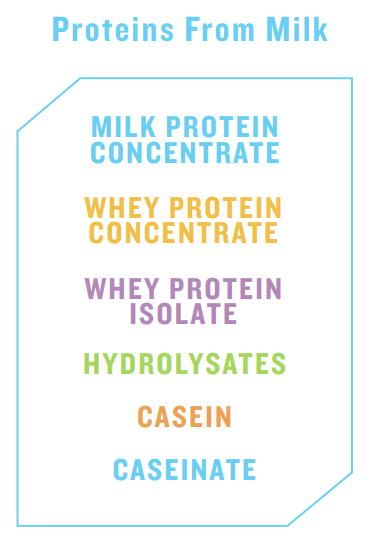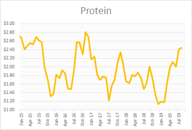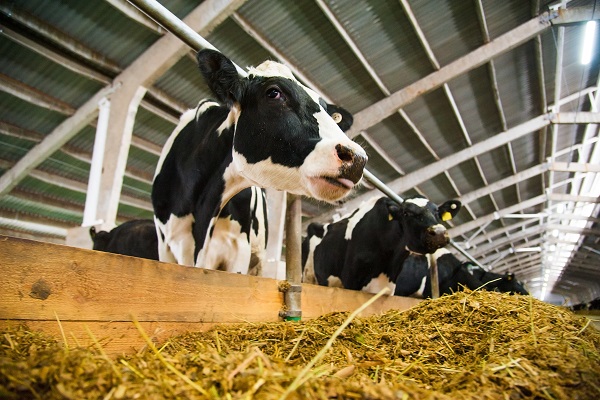THE PROTEINS IN MILK
Posted by Lindsey Ormond, Director of Research & Development on Apr 17, 2020 11:50:05 AM
Milk contains two main types of proteins – casein and whey. Casein accounts for 80% of the protein in milk, while whey contributes around 20%.
Read MoreTopics: HUMAN NUTRITION
NOT ALL PROTEINS ARE CREATED EQUAL
Posted by Lindsey Ormond, Director of Research & Development on Mar 19, 2020 12:59:11 PM
Consumers are waking up to the benefits that dietary protein can provide. From endurance athletes, and weekend warriors, to those in their advancing years, however, not all proteins are created equal. When it comes to the composition of amino acids in protein, some sources of protein over others are better at meeting human requirements.
Proteins are composed of building blocks called amino acids, which are then joined together by peptide bonds to create larger peptide units. There are 20 amino acids in the diet, 9 of which are essential, meaning they must be consumed in the diet as the human body cannot synthesize them itself. Protein quality is assessed based on the amino acid composition of a protein, its ability to satisfy protein requirements, and how well it is absorbed by the body.
Read MoreTopics: HUMAN NUTRITION
Milk Specialties Global is boosting the North American supply chain with Calcium Caseinate sourced and produced in the United States. The rBGH free skim milk is sourced from California dairy farms and transported to the Visalia, CA facility to produce Calcium Caseinate.
Calcium Caseinate is a highly functional ingredient with an excellent amino acid profile. It has excellent dispersibility, viscosity, and emulsification capabilities; making it a versatile ingredient of choice for ready to mix sports nutrition powders and other functional food applications.
The process of producing Calcium Caseinate involves gentle acidification and neutralization of the milk to help retain all superior nutritional qualities. Calcium Caseinate is an extremely nutritious and clean tasting ingredient that delivers a high level of protein with low levels of carbohydrates (sugar/lactose). It is also high in naturally occurring calcium phosphate which is the building block for strong teeth and bones, helping to maintain bone density and structural functions.
Milk Specialties Global’s Calcium Caseinate is available in instant and regular form, with non-GMO, Non-GMO Project Verified, Kosher and Halal certifications. Instant Calcium Caseinate is recommended for use in all nutritional powder formulations to improve nutritional and sensory attributes as well as increase the product shelf-life.
To learn more about Milk Specialties Global’s Calcium Caseinate and our extensive dairy protein portfolio, contact your Milk Specialties Account Manager or email us directly at ingredientsales@milkspecialties.com.
Read MoreTopics: HUMAN NUTRITION
DEHORNING: HOW TO MAKE A NECESSARY JOB EASIER WITH LIDOCAINE BLOCKING
Posted by Elizabeth Marvel on Mar 10, 2020 2:11:15 PM
Until polled genetics become more available in the dairy industry, dehorning is a necessary task on the farm. Dehorning is a painful process; therefore, it is necessary to provide pain management to the calf. Dehorning should be performed prior to eight weeks of age The younger the calf the faster they seem to recover from the procedure. You can offer pain management by Lidocaine blocking and offering a drug like Meloxicam. Lidocaine and Meloxicam are both very economical choices, just make sure you receive a prescription from your veterinarian.
Read MoreTopics: ANIMAL NUTRITION
Topics: HUMAN NUTRITION
CALF COLD STRESS MONITOR: A NEW WAY TO ESTIMATE THE INCREASED ENERGY NEEDS FOR CALVES UNDERGOING COLD STRESS
Posted by Milk Specialties Technical Experts on Nov 8, 2019 9:46:27 AM
Colder weather has descended on many parts of the U.S. dairy country, and that means we need to pay increased attention to the impact of cold stress on young dairy calves raised outside. Calves less than 3 weeks of age are most susceptible to cold stress because they are born with very little body fat reserves to draw upon and do not consume very much calf starter at this young age. These young calves must rely on the energy being provided by the liquid diet they are consuming to meet their energy requirements for maintenance (basic body functions such as digestion, immune function, and nutrient metabolism) and for growth.
Read MoreTopics: ANIMAL NUTRITION
PROTEIN DRIVING RECORD MILK PRICES
Posted by Milk Specialties Technical Experts on Sep 20, 2019 10:26:38 AM
Milk and Milk Protein prices are going up, with prices projected to hit a four-year high. Now, more than ever, is the time to feed Energy Booster™ products to capitalize on the increasing price of milk volume and components.
Read MoreTopics: ANIMAL NUTRITION
THE 4 MAIN DIFFERENCES BETWEEN DAIRY AND PLANT PROTEIN
Posted by Lindsey Ormond on Jul 24, 2019 11:09:21 AM
Topics: HUMAN NUTRITION
Five Nutritional Strategies to Minimize the Effect of Summer Heat Stress on Lactating Cows
Posted by Charles Soderholm, DVM, PhD Dairy Science on Jul 2, 2019 2:11:05 PM
Summer heat stress affects cows throughout the U.S., resulting in reduced feed intake, lower milk production, poor reproductive performance and excessive weight loss. The reduction in milk yield associated with heat stress occurs primarily because of declining feed intake. The metabolic effects of heat stress can be minimized with practical knowledge, supplemental fats and other nutritional strategies.
Topics: ANIMAL NUTRITION
What could be easier than mixing a bit of powder in water, right? If it were only that simple…
When it comes to mixing milk replacer and feeding it to calves, there are a surprising number of issues that can creep up, either from a mixing, feeding or an animal performance standpoint. How we measure milk replacer powder, how we mix it with water and the temperature at mixing and feeding time affect both the milk replacer and the calf.
Read MoreTopics: ANIMAL NUTRITION








